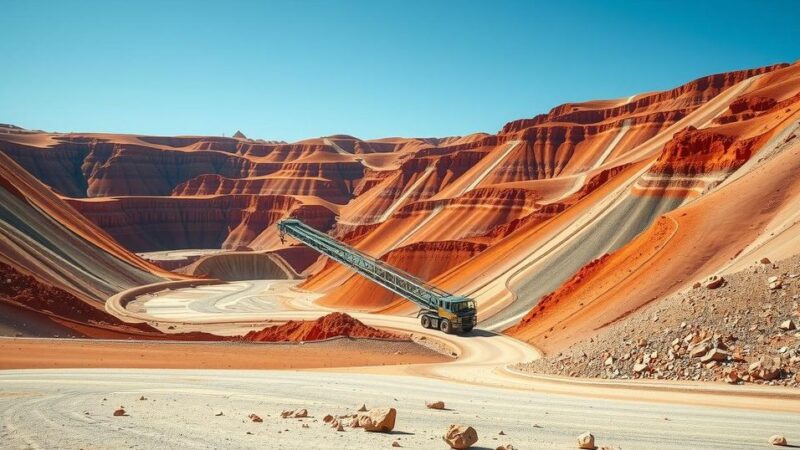A Glencore-owned copper mine in the DRC is at the center of a dispute over €800 million in royalties claimed by local authorities. While bank accounts were frozen and a warehouse sealed, copper and cobalt production has not been affected. The DRC has emerged as a leading global supplier of these metals, vital for green energy initiatives.
Glencore Plc is currently facing a significant dispute regarding alleged unpaid royalties at its Kamoto Copper Company (KCC) mine located in the Democratic Republic of Congo (DRC). The local government’s tax authority, known as DGRAD, asserts that KCC owes approximately €800 million ($894 million) to the Congolese state. Sources indicate that the situation escalated to the freezing of the company’s local bank accounts earlier this year, and the tax officials recently conducted an unscheduled visit to temporarily seal off a warehouse where KCC was storing valuable metal resources. Fortunately, the facility was unsealed within a day, and regular operations resumed promptly, despite the ongoing conflict. Kamoto Copper Co. is a crucial asset for Glencore, with the Swiss corporation maintaining a 75% stake in the operation. The mine holds a prominent position as one of the largest in the DRC, with reported exports of 200,000 tonnes of copper and 16,000 tonnes of cobalt in 2023, according to government statistics. Notably, the dispute has not impeded production; in the first half of the year, the mine yielded 89,000 tonnes of copper and 11,700 tonnes of cobalt. In addressing the matter, a spokesperson from the DRC’s finance ministry, which governs DGRAD, stated they are currently assessing KCC’s financial records to ensure a resolution that is favorable to both the business environment and national interests. Meanwhile, Glencore has refrained from commenting publicly on the dispute, although it has disclosed that KCC’s total contributions in taxes and royalties in the DRC from 2021 to 2023 reached $2.3 billion. The agency’s decision to restrict bank activities and seize company property followed unsuccessful negotiations aimed at resolving the issue. The DRC has seen a remarkable increase in copper exports since 2015, recently surpassing Peru to claim the title of the second-largest copper producer globally, a significant milestone considering copper’s vital role in the energy transition. Furthermore, the DRC is the world’s leading producer of cobalt, accounting for approximately three-quarters of the total global supply in the previous year.
The Democratic Republic of Congo is endowed with vast mineral resources, becoming a pivotal player in the global mining industry, particularly for copper and cobalt, which are essential components in modern technologies, including electric vehicles and renewable energy solutions. The Kamoto Copper Co. is a significant contributor to the DRC’s economy, hence the scrutiny from the local tax authorities reflects broader efforts to optimize revenue collection from the mining sector. Disputes over royalties and tax obligations are not uncommon in the sector, spotlighting the delicate balance between encouraging foreign investment and ensuring the state benefits sufficiently from its natural resources. The current royalty dispute between Glencore and the DGRAD highlights the complexities faced by multinational corporations operating in resource-rich countries, where negotiations can become contentious, affecting operational stability. The freezing of bank accounts and property seizures signal a stringent approach by the DRC’s government to enforce compliance, which may impact the investment climate.
In summary, Glencore’s Kamoto Copper Company finds itself entangled in a substantial royalty dispute with the DRC’s tax authority, which claims over €800 million is owed to the government. While the situation has prompted significant actions, including the freezing of accounts and temporary facility seals, production appears unaffected at this juncture. The DRC continues to bolster its position as a leading source of copper and cobalt, underscoring the ongoing importance and sensitivity of mining operations within its borders. As the government strives to balance fiscal responsibility with the interests of foreign investors, the resolution of this dispute will be pivotal for both parties moving forward.
Original Source: www.mining.com







